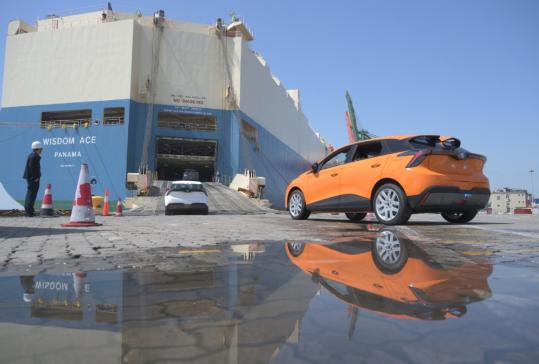Europe starts to impose car import tariffs
The European Union has imposed additional tariffs on imports of electric vehicles made in China from Friday. There is, however, a four-month window during which the tariffs are provisional and intensive talks are expected to continue between the EU and China.
He Yadong, a spokesperson of the Ministry of Commerce, said on Thursday that China is strongly opposed to the tariffs. He added that both sides have so far held several rounds of technical talks over tariffs on the issue.
"We hope that the European and Chinese sides will move in the same direction, show sincerity, and push forward with the consultation process as soon as possible," said He.
The provisional tariffs of up to 37.6 percent on top of the standard 10 percent duty are the result of the EU's anti-subsidy investigation, which started in October.
It has nearly four more months to run, at the end of which, the European Commission, the EU's executive arm, could propose definitive duties on which EU members would vote.
However, EU countries are divided on whether to back additional tariffs on Chinese-built electric vehicles, highlighting Brussels' challenge in building support for its largest trade case yet.
Germany, whose carmakers made a third of their sales last year in China, wants to stop the tariffs, while France has been among the firmest backers.
The German Association of the Automotive Industry, better known as the VDA, said the tariffs would affect European companies and their joint ventures as well.
"This is because a large proportion of vehicle imports from China into the EU come from European and American manufacturers. The announced anti-subsidy tariffs are sometimes even higher for European companies than for Chinese companies," said the VDA.
Europe's biggest carmaker Volkswagen was swift to criticize Thursday's announcement. "The negative effects of this decision outweigh any benefits for the European and especially the German automotive industry," a Volkswagen spokesperson said in a statement.
The VDA said: "Competitiveness is created by competition. Anti-subsidy tariffs are not an adequate measure to strengthen European competitiveness and resilience in the long term."
It added that the anti-subsidy tariffs would make electric vehicles more expensive on the European market or prevent them from being offered on the market at all.
"This would limit the availability of cheap electric vehicles for customers and further complicate the already stalled ramp-up of electromobility. This is neither in the interests of European consumers nor does it correspond to the goals of the Green Deal."
Chinese brands MG and Nio suggested they might raise prices in Europe later this year. Tesla said last month it planned to increase the prices of its Model 3.
A majority of countries are still weighing the pros and cons of the escalating trade spat, according to an informal poll of EU governments.
The issue will be put to members in an advisory vote in the coming weeks, the first official test of support in a landmark case for the European Commission. The EU initiated the probe without an industry complaint, the first such trade case of this kind.
EU members will also vote in October if the commission proposes multi-year tariffs at the end of its investigation.
These would be blocked if a "qualified majority" of at least 15 countries representing 65 percent of the EU population votes against them.
France, Italy and Spain, with 40 percent of the EU population, have indicated they would back tariffs. "Europe must defend itself if our companies are harmed and do not compete on equal terms," Spain's economy ministry said.
However, the Czech Republic, Greece, Ireland and Poland were still debating the issue, official and government sources said.

